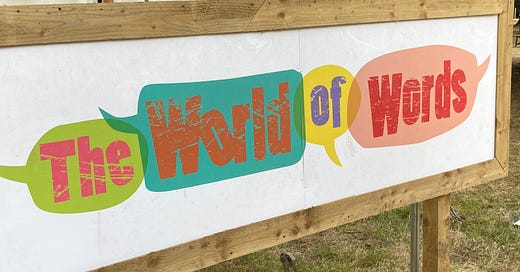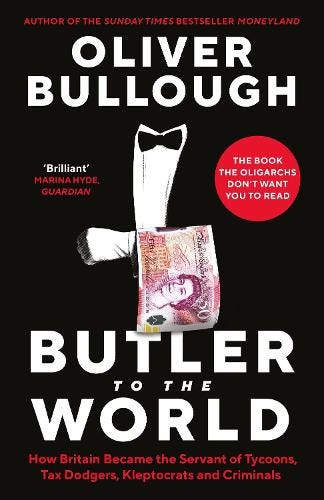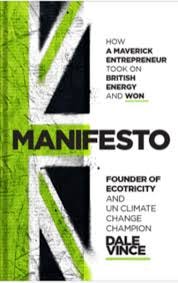2 August 2022. Wealth | Transition
Britain as butler to the world’s wealthy // Getting to Net Zero is a political problem
Welcome to Just Two Things, which I try to publish daily, five days a week. Some links may also appear on my blog from time to time. Links to the main articles are in cross-heads as well as the story. A reminder that if you don’t see Just Two Things in your inbox, it might have been routed to your spam filter.
I was at WOMAD over the weekend—the 40th edition of the festival. It’s mostly known as a showcase for world music, but has a lively side programme of talks. Here’s some notes from a couple of these.
(Photo: Andrew Curry. CC0)
1: Britain as butler to the world’s wealthy
The journalist Oliver Bullough has an argument that Britain’s top-end services sector is the butler to the world’s oligarchs. His book of that title includes references to the most famous butler in English literature, Jeeves, who quietly fixes the scrapes that his non-too-bright employer Wooster, and his friends, get themselves into.
The reason Jeeves does it? He gets handsomely tipped by Wooster’s friends for sorting things out.
(John Gordon Sinclair as Jeeves in ‘Jeeves and Wooster in ‘Perfect Nonsense’. Photo: The Lowry/ Uli Weber. CC BY-NC-SA 2.0)
At WOMAD, Bullough told the story of this idea through the story of two interviews. The first was with an American academic who was researching oligarchs. Bullough had come to his attention because he and others had been running ’kleptocracy tours’ in west London, taking people round and pointing out the multi-million pound homes of the world’s billionaires.
As they talked, the academic asked a series of questions about the institutions that the UK had to combat kleptocracy: what was our equivalent, for example, of the South District of New York, which prosecutes financial crime? How did our process for unexplained wealth orders work? Who investigated the possible crimes of the super-rich, in the way that the Department of Justice did in the US?
By Bullough’s account, doubtless now well polished, each of these he had to meet with a shrug: well, we sort of have something like that, but it doesn’t do much. The US, he observed, was the policeman to the world: Britain was more like a butler.
Britain didn’t used to perform this role for the world’s rich, and Bullough traces it back to 1944, and the Bretton Woods conference, which—in his characterisation—sought to ensure that the world’s economic system supported democratic systems and spread wealth, rather than the interests of the wealthy, as a shield against the re-emergence of fascism.
The results of that worked well for 25 years, although it was helped by the long-period of post-war reconstruction, but one of the ways it was done was to put capital controls in place that limited the extent to which the wealthy could move their money around.
The first breach in this system was an accident. In 1955 the Midland Bank—now part of HSBC—needed capital, while the Russian Narodny Bank needed somewhere to put dollars where they weren’t at risk of being frozen by the US authorities. And because this dollar transaction was being done between a Russian bank and a British bank, it turned out that the capital controls didn’t apply.
Once the British Treasury realised the opportunities, they encouraged it (there’s a suggestion in Nicholas Shaxson’s book The Curse of Finance that the Treasury had been actively looking for this sort of opportunity to shore up the City of London as the British Empire receded.)
Roll this all forwards 50-60 years, and there is nothing that the British elite services can’t do for a passing kleptocrat. Lawyers will help you hide assets behind shell companies or sue an inconvenient critic. Accountants will devise ever more elaborate tax avoidance schemes. Politicians will help you buy a newspaper, universities offer their services so you can launder your reputation. Expensive schools will look after your children’s education. And so on.
And although the Russian-Ukraine war has meant some half-hearted attempts to constrain Russian wealth, nothing has been done about any of the others—including the Ukraine, of course, which has its own share of oligarchs. Or China, whose oligarchs are generally far richer than the Russians.
The second interview was with a lawyer who got in touch after Russia invaded the Ukraine, for some information. The lawyer had forgotten, but Bullough had remembered, that they had been in touch before. He had made a film about Ukraine, and she had sent him a letter threatening libel action on behalf of a rich client. The film was never shown.
After he called her they met for a coffee, and he described the film to her. “It sounds really interesting,” she said. Bullough says the whole culture of financial butlering is full of people who are just doing their job, are well-paid for doing it, and don’t think too deeply about what they do.
The role of the British state in all of this is relevant too. Bullugh talked about the Scottish limited partnership, which was designed to manage the legal status of agricultural tenants, but turns out also to be a very effective mechanism for hiding money.
The SNP’s Treasury spokesman Roger Mullin tried to close this loophole, and raised questions in the House of Commons and so on. The Treasury, in response, relaxed the restrictions, which were generating fees for the City of London.
Part of the argument you hear here is that if Britain wasn’t doing it, other people would, but this isn’t true, since there’s hardly a race to the bottom between countries to facilitate money laundering and so on. And apart from the moral argument—we shouldn’t help the super-wealthy hide money that was mostly gained improperly—having your financial and legal systems used to service oligarchs is bad for a whole range of publicly desirable outcomes, including freedom of speech, financial system integrity, the impact on housing markets, the damaging economic effects of offshore wealth, and so on.
Bullough noted, wryly, that Britain is very good at passing well-written laws which express the intention of doing something, and also very good at ensuring that the ones that are inconvenient are not enforced. A couple of current examples: the legislation that allows the current pursuit of the wealth of Russian oligarchs is due to expire next April. When someone—whose name I didn’t catch- from the National Crime Agency was asked by the Parliamentary Intelligence and Security Committee why they hadn’t done more to pursue Russian oligarchs, they answered:
I’m bluntly concerned about the impact on my budget.
The first sign that Britain had any intention of taking any of this seriously would be an attempt to bridge the gap in the resources spent on unexplained wealth orders by the US and the UK. The FBI budgets are three times per head those of the National Crime Agency.
2: Getting to Net Zero is a political problem
Dale Vince is best known as the founder of the green energy company Ecotricity, although he has stepped away from that role now. He spoke at WOMAD about renewables and how to get the political class to take the transition seriously.
(Disclosures: Ecotricity is a sponsor of WOMAD; I am an Ecotricity customer).
He was interviewed on WOMAD’s Ecotricity stage by Ian Dale, the journalist and broadcaster Ian Dale, and a version of the conversation will be released on Dale Vince’s podcast Zerocarbonista in due course.
Vince’s going in position was that
we’ve got everything we need to get t Net Zero. What we don’t have is politicians who want to get us there.
Part of the barrier here is that many politicians simply have a ‘knowledge deficit’ about the state of the energy market and the cost of renewables compared to other energy systems. (They’re now significantly cheaper). This is something I’ve heard about politicians before: that effectively they wander around with outdated models of the world in their heads, which means they are resistant to ideas which ought to be common sense.
They’re also not very good at thinking systemically.
So Vince pointed out that we’d had en energy crisis for the past two winters—this was before Russia invaded Ukraine—and the war had just made it worse.
People still have an idea in their heads that there isn’t enough wind and solar to power British energy demand, but the National Grid thinks that there is (in the 1990s it used to think there would be a 20% ceiling for renewables). Doing this is not completely straightforward—it needs a smarter Grid—but it is feasible and the investment we need to get there is taking place.
Vince had been on Ian Dale’s radio show talking renewables with Richard Tice of the far right UK Reform party, who was a big fan of fracking, which he described as “our treasure”.
I wouldn’t normally give air-time to a tiny group of unrepresentative right-wingers, but this obsession with fracking is also seen in the Conservative Party as well. Dale pointed out on the radio show that it would take five years to prospect for the stuff and start production—and that supplies would run out in five years. So we might as well just push on with renewables now, which take about a year from being planned to producing power.
(Anti-fracking activists bare the ‘naked truth’ at UK Investor Show. Photo Reclaim The Power/flickr. CC BY 2.0)
Dale asked him why he thought politicians were obsessed by fracking:
It’s the word—it sounds well hard. The onomatopoeic nature of the word is very attractive to a certain type of right-winger.
But he added that there was an issue about the discourse here (my word, not his). Renewables are about nature, fracking is industrial.
They got on to nuclear power as well, which has the same delays as fracking, only worse: 10 years to plan, 10 years to build (if it doesn’t over-run) and produces very expensive electricity. And then you still have the legacy of the radioactive waste.
In contrast he said, if a magic new energy supply was discovered in 30 years (the dream on fusion power, perhaps?) you could take down the wind turbines and the land would just grow over the sites.
In passing, by the way, he’s not a fan of heat pumps (“a colossal mistake”) although sadly Ian Dale didn’t press him on this. One of his current ventures is a pilot project for green gas near Reading, in the south of England, which will service 3,000 homes, initially with a 90% reduction in carbon against fossil-fuel gas (this number will increase as the technology gets better).
I was wondering about land take here, and competition with food: after some light research the answer to the first question is 3,000 acres (1200 hectares), which sounds like about an acre home. It uses grass but doesn’t compete with land that could be used for food.
Vince’s next project is to set up a think-tank to promote the transition to net Zero. It’s the Green Britain Foundation, and Vince explained that he’d decided that this was the best way for him to influence politicians. He wanted to make the transition, and the policies it needs to succeed, as easy as possible for the political class.
Increasingly the ecological crisis and the climate crises look more like political crises, and I took this ambition to be another sign of this. The younger Dale Vince who set up ecotricity believed that we could get to Net Zero through innovation and the market; the older one thinks that the thing that’s in the way of that is the political class.
Vince’s next project is to set up a think-tank to promote the transition to net Zero. It’s the Green Britain Foundation, and Vince explained that he’d decided that this was the best way for him to influence politicians. He wanted to make the transition, and the policies it needs to succeed, as easy as possible for politicians to understand and act on.
(Vince’s recently published book Manifesto. In practice, it’s more like an autobiography)
Increasingly the ecological crisis and the climate crises look more like political crises, and I took this ambition to be another sign of this. The younger Dale Vince who set up ecotricity believed that we could get to Net Zero through innovation and the market; the older one thinks that the thing that’s in the way of that is the political class.
He was, incidentally, asked a question about whether Britain’s energy companies should be taken into public ownership, and showed a touching faith in the ability of better regulation to resolve the aggressively extractive behaviour of the big energy companies. Perhaps he needs to have a chat with Oliver Bullough.
j2t#354
If you are enjoying Just Two Things, please do send it on to a friend or colleague.







